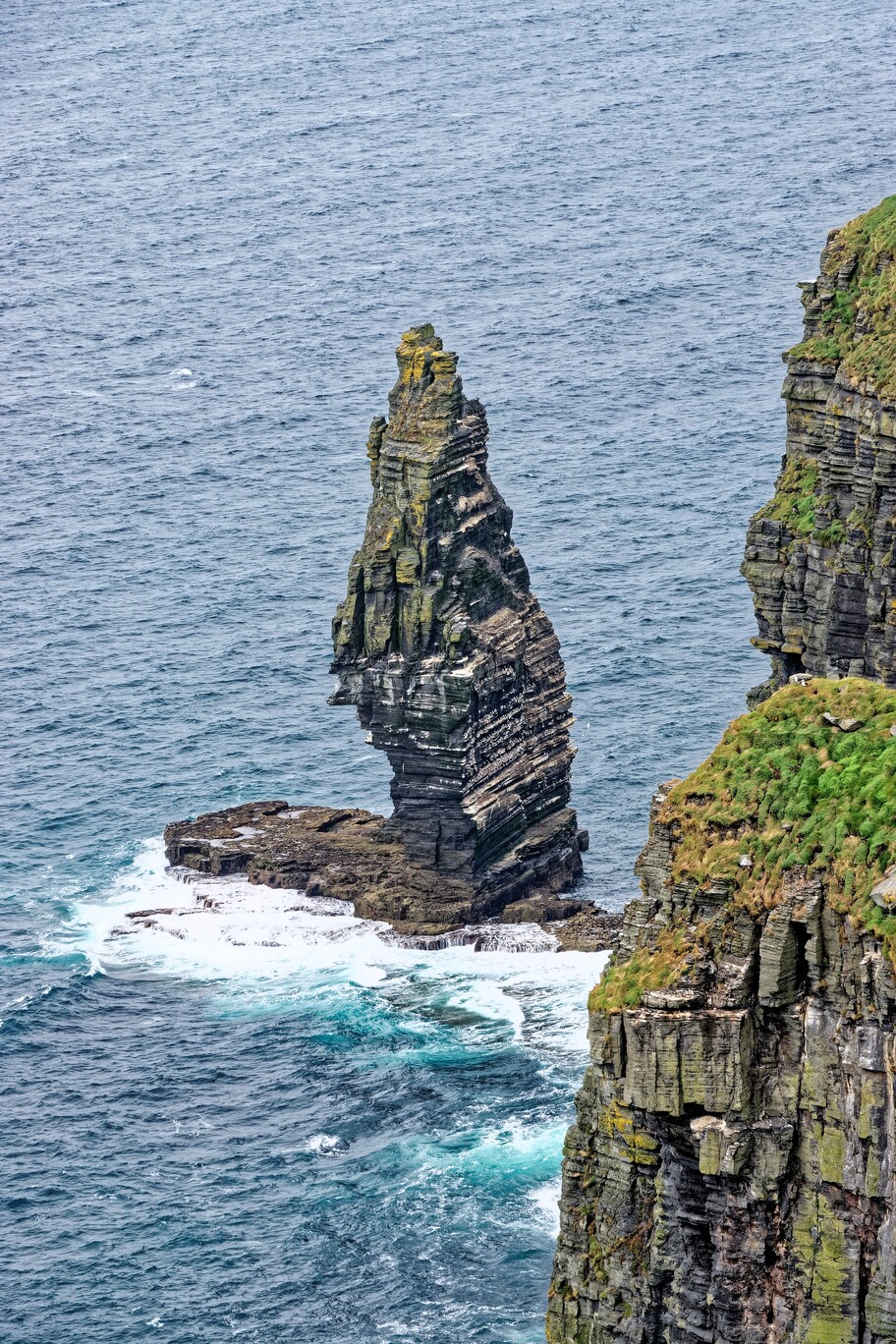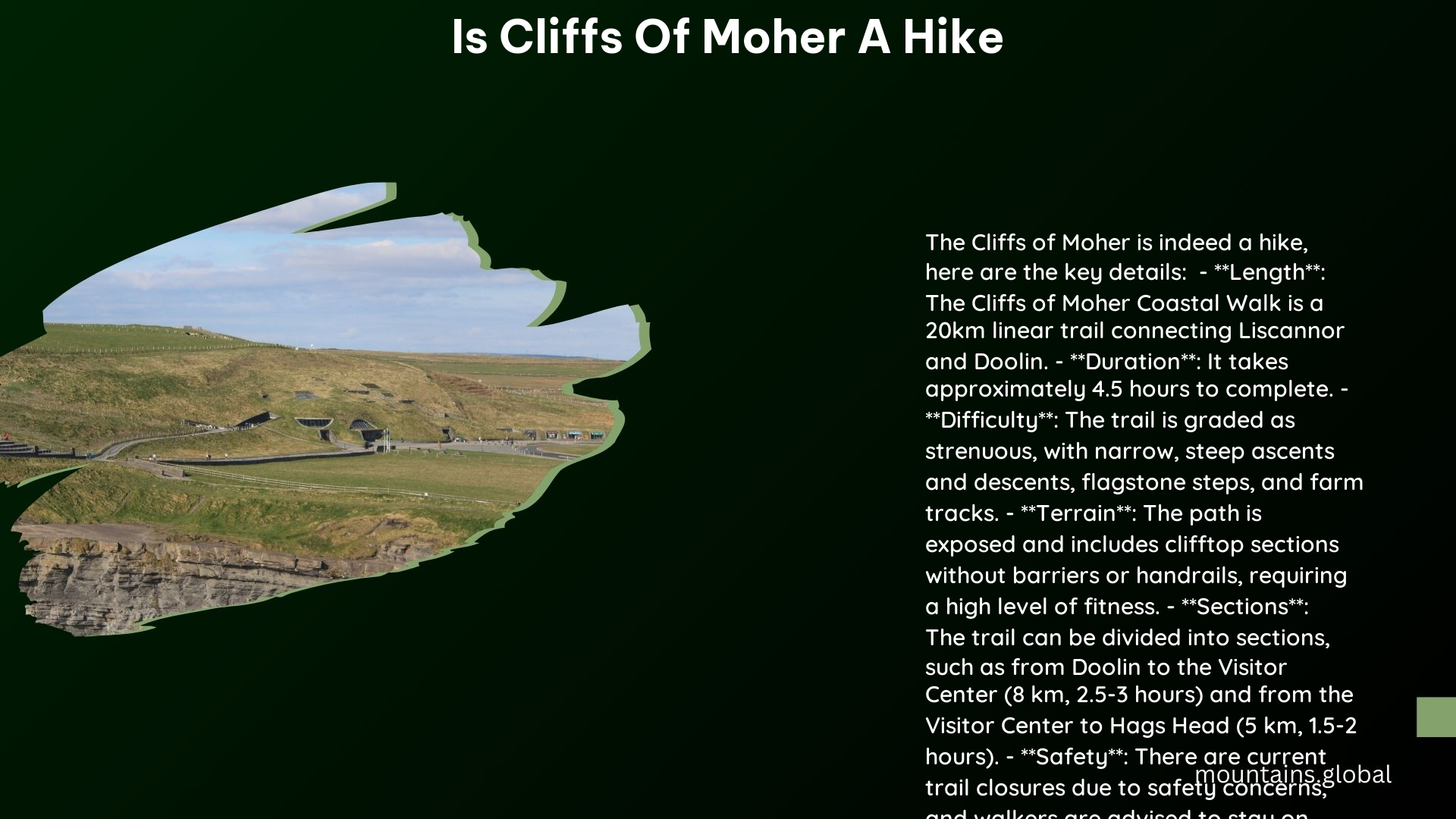The Cliffs of Moher is indeed a hike, offering a spectacular coastal walking experience along Ireland’s western edge. This iconic landmark features a 20 km linear trail from Liscannor to Doolin, with breathtaking views of the Atlantic Ocean. The hike presents varying difficulty levels, from moderate to challenging, depending on the chosen route and weather conditions. Hikers can explore dramatic cliffs, encounter diverse wildlife, and immerse themselves in the raw beauty of Ireland’s rugged coastline.
What Makes the Cliffs of Moher a Unique Hiking Destination?

The Cliffs of Moher stand out as a hiking destination for several reasons:
- Dramatic Scenery: Towering cliffs plunging into the Atlantic Ocean
- Diverse Wildlife: Opportunity to spot seabirds and marine life
- Cultural Significance: Rich in Irish folklore and history
- Challenging Terrain: Varied landscapes from farmland to rocky paths
- Stunning Vistas: Panoramic views of the Aran Islands and Galway Bay
What Are the Key Details of the Cliffs of Moher Hike?

Here’s a breakdown of the essential information for hiking the Cliffs of Moher:
| Aspect | Details |
|---|---|
| Total Distance | Approximately 20 km (12.4 miles) |
| Elevation Gain | About 250 meters (820 feet) |
| Difficulty Level | Medium to High |
| Duration | 4-6 hours (full trail) |
| Start/End Points | Liscannor to Doolin (or vice versa) |
| Key Landmarks | O’Brien’s Tower, Hags Head, Great Sea Stack |
How Challenging is the Cliffs of Moher Hike?
The Cliffs of Moher hike presents various challenges:
- Exposed Cliff Edges: Many sections lack barriers or handrails
- Uneven Terrain: Rocky paths and steep ascents in places
- Weather Conditions: Sudden changes with strong winds and fog common
- Physical Demands: Requires good fitness level for the full trail
- Navigation: Some sections may be poorly marked or closed due to safety concerns
What Are the Best Sections to Hike at the Cliffs of Moher?
While the entire trail offers stunning views, some sections stand out:
- Hags Head to Visitor Centre:
- Distance: 5 km
- Highlights: Dramatic southern cliffs, less crowded
-
Difficulty: Moderate to challenging
-
Visitor Centre to Doolin:
- Distance: 8 km
- Highlights: O’Brien’s Tower, views of the Aran Islands
-
Difficulty: Moderate
-
Doolin to Surfers Path:
- Distance: 2 km
- Highlights: Northern cliff views, less touristy
- Difficulty: Easy to moderate
What Should Hikers Prepare for the Cliffs of Moher Trail?
Proper preparation is crucial for a safe and enjoyable hike:
- Footwear: Sturdy, waterproof hiking boots
- Clothing: Layered, weather-appropriate attire
- Navigation: Map and compass (GPS as backup)
- Supplies: Plenty of water, snacks, and a first-aid kit
- Communication: Fully charged phone for emergencies
- Timing: Check weather forecast and sunset times
- Permits: No permits required, but visitor centre has entry fee
Are There Guided Hikes Available at the Cliffs of Moher?
While specific guided hike packages aren’t detailed in the sources, several options exist:
- Local Tour Operators: Offer customized guided hikes
- Visitor Centre Tours: May provide guided walks in the immediate area
- Private Guides: Can be hired for personalized experiences
- Group Excursions: Some travel companies include guided hikes in their Ireland tours
Benefits of guided hikes include:
– Expert knowledge of the area’s history and ecology
– Enhanced safety with experienced guides
– Potential access to less-known viewpoints and trails
What Are the Best Times to Hike the Cliffs of Moher?
Timing your hike can greatly enhance the experience:
- Season:
- Spring (March-May): Mild weather, wildflowers blooming
- Summer (June-August): Longest daylight hours, but more crowded
- Autumn (September-November): Beautiful colors, fewer tourists
-
Winter (December-February): Dramatic stormy seas, but challenging conditions
-
Time of Day:
- Early Morning: Peaceful atmosphere, good for photography
- Midday: Clearest views on sunny days
-
Sunset: Spectacular colors, fewer day-trippers
-
Tidal Considerations:
- Low Tide: Better for exploring beach areas (where safe and accessible)
- High Tide: More dramatic wave action against the cliffs
How Can Hikers Ensure Safety While Hiking the Cliffs of Moher?
Safety is paramount when hiking the Cliffs of Moher:
- Stay on Designated Paths: Avoid approaching cliff edges
- Check Weather: Be prepared for sudden changes
- Inform Others: Let someone know your hiking plans
- Carry Essentials: Water, food, first-aid kit, and appropriate gear
- Be Aware of Time: Start early to avoid hiking in darkness
- Respect Closures: Adhere to any trail closures or warnings
- Use Caution: Be mindful of slippery surfaces, especially after rain
What Unique Flora and Fauna Can Hikers Encounter?
The Cliffs of Moher ecosystem is rich in biodiversity:
- Seabirds:
- Puffins (April to July)
- Guillemots
- Razorbills
-
Kittiwakes
-
Marine Life:
- Dolphins
- Seals
-
Occasional whale sightings
-
Flora:
- Sea pinks
- Burnet rose
-
Various lichens and mosses
-
Land Animals:
- Irish hares
- Foxes
- Various bird species in surrounding farmland
Hikers should observe wildlife from a distance and avoid disturbing nesting sites.
How Does the Cliffs of Moher Hike Connect to Other Trails?
The Cliffs of Moher walk is part of larger trail networks:
- Burren Way:
- 114 km long-distance trail
- Connects Lahinch to Corofin
-
Cliffs of Moher is a highlight section
-
Wild Atlantic Way:
- 2,500 km coastal touring route
-
Cliffs of Moher is a signature discovery point
-
Local Loop Walks:
- Several shorter circular walks in the area
- Can be combined with sections of the Cliffs walk
These connections allow hikers to extend their journey or explore the wider region on foot.
References:
1. https://www.cliffsofmohercruises.ie/cliffs-of-moher-walk/
2. https://www.cliffsofmoher.ie/your-visit/beyond-the-cliffs-places-to-see/cliffs-of-moher-coastal-walk/
3. https://www.ottsworld.com/blogs/cliffs-of-moher-walk-ireland/
